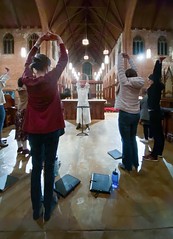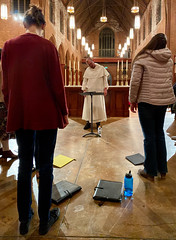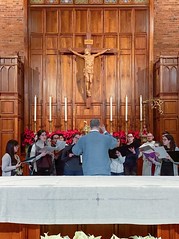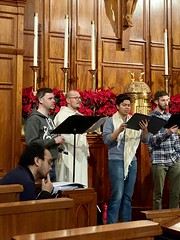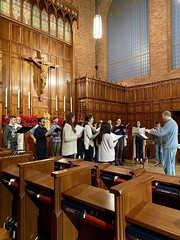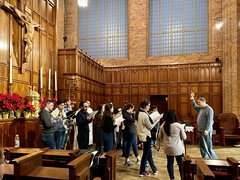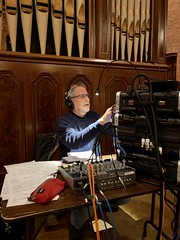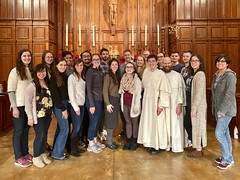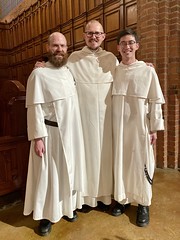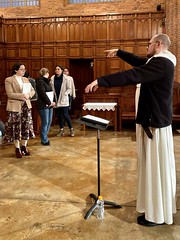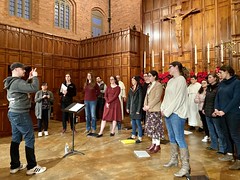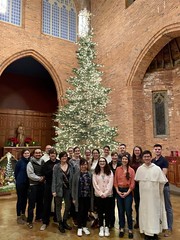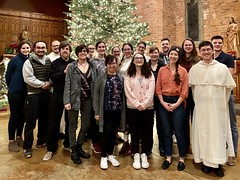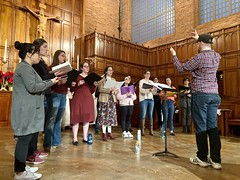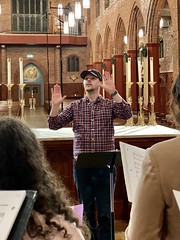This style of music allows people to join in a prayerful way – it allows it to become almost second nature, rather than being all-encompassing of attention. It facilitates rather than distracts from prayer. It has a potential to draw young people out of their day to day toward beauty by providing an experience that is approachable but set apart.

Prosta, piękna, pełna godności, możliwa do zaśpiewania. Taka jest muzyka polskich dominikanów, teraz dostępna w języku angielskim. Różnorodna obsada wokalistów-pasjonatów z całego kraju spotkała się podczas długiego weekendu, aby nagrać dwa albumy muzyki liturgicznej.
Większość wykonawców nie znała dużej części utworów, jednak piękno muzyki połączone z duchową głębią tekstów dostarczyło wykonawcom inspirację od początku do końca tego pełnego wyzwań doświadczenia. Występy przedstawione w albumach, nagrane przez ochotników po tylko krótkim okresie prób, mają na celu zainspirować innych i zachęcić ich, by używali tych właśnie utworów na liturgiach. Są one proste do nauczenia się w krótkim czasie i śpiewania przez oddane chóry z najskromniejszymi nawet możliwościami finansowymi.
Materiał z dwóch albumów służy jako podstawa muzyczna na cały rok liturgiczny. Dzisiaj z radością dzielimy się z Wami pierwszym albumem, „Soul of Christ”, z muzyką chóralną na Wielki Post, Wielkanoc i okres zwykły. Drugi album, zawierający muzykę na czas Adwentu, święta maryjne i okres zwykły, ma się ukazać jesienią 2020 roku.

Pobierz nuty
Z radością dzielimy się tą muzyką z całym światem za darmo. Pobierz nasze utwory i zacznij śpiewać! Jesteśmy pewni, że ta muzyka zmieni modlitwę zarówno dla śpiewających jak i wiernych poprzez jej potężne, medytacyjne piękno.
-
Nagranie i mastering
Nagranie dźwięku: Bill Levey, Via Audio Seattle
Mastering i postprodukcja: Magda Piotrowska, Hear Candy Mastering
Edytor nut: Jan Warchoł
Projekt okładki: Joanna Grabarska -
DLC Choir 1
Christopher Mueller, dyrygent
SOPRANY
Julia Bellefeuille, Erin Brown, Hope Chamberlain, Becca Chavarría, Danielle Dellino, Eugenia Geisel, Mary Van HollebekeALTY
Mikaela Hertel, Ariaga Mucek, Tess Murray, Annie Nguyen, Jenny TaylorTENORY
Paul-Henry Flynn, Marcin Juraszek, br. Andrew Thomas Kang OP, o. Gabriel Torretta OPBASY
Zachary Groeblinghoff, o. Łukasz Misko OP, Peter Molina, Giordan MonteroData nagrania: czwartek 2 stycznia 2020
Kościół pw. Najświętszego Sakramentu (Blessed Sacrament Church), Seattle, USA
Utwory: 2, 3, 6, 8, 10, 11, 12, 19
-
DLC Choir 2
Zachary Groeblinghoff, dyrygent
SOPRANY
Julia Bellefeuille, Erin Brown, Hope Chamberlain, Becca Chavarría, Eugenia Geisel, Lizzie Priddis, Sophia Holt, Caitlin LynchALTY
Mikaela Hertel, Tess Murray, Annie Nguyen, Jenny TaylorTENORY
Marcin Juraszek, br. Andrew Thomas Kang OP, o. Łukasz Miśko OP.BASY
Matthew McGehee, Peter Molina, Giordan MonteroData nagrania: sobota 4 stycznia 2020.
Utwory: 1, 4, 5, 7, 9, 13, 14, 15, 16, 17, 18
Projekt takiego kalibru ma wielu uczestników i generuje duże koszty, z wdzięcznością więc przyjmiemy datki od kogokolwiek, kto chciałby wesprzeć naszą pracę. Proszę przejść do zakładki Wsparcie na górze, aby dokonać dotacji dowolnej wielkości do Dominikańskiego Ośrodka Liturgicznego który zlecił wykonanie i nagrał utwory.
I never encountered this music growing up, but experiencing liturgies with the Polish Dominican music (chant and polyphony), though completely foreign, felt like home to me. The beauty of the sound and the contemplative style draws me into prayer in a way I have never experienced before. Hearing and singing it draws me to close my eyes and raise my mind to the heavens. It has taught me to pray with scripture through music. When I had the privilege of having this music as a part of my church’s daily liturgies, the music, and in turn, scripture and prayer, became a part of my day, a part of my breathing. The simplicity of the words and the undeniable beauty of the music draws me in and remains in me. It has given me a little taste of fulfilling our call to 'pray without ceasing’, infiltrating my mind and my day with this sung prayer.

Amira Davis
naukowiec, SeattleOver the course of the past few decades, the Polish Dominicans have fostered and developed a tremendous corpus of vernacular liturgical music, written in a simple and beautiful choral style that both ennobles liturgical worship and readily invites congregational participation in it. It is wonderful to see more and more of that treasury of contemporary liturgical music being adapted into English and made widely available to the English speaking world through the work of the Dominican Liturgical Center. To anyone who is interested in prayerful and dignified liturgical music in the English language, I highly recommend the work of the Dominican Liturgical Center and its new “Soul of Christ” project, as well as its future projects to share more of the Polish Dominican liturgical music tradition with English-speaking worshippers throughout the world. While the worship of God in different vernacular languages necessarily differs in some ways throughout the world, beauty is universal, and the Polish Dominican liturgical music tradition has a special contribution to make to this beautiful and dignified worship of God in sacred song.

Michael O’Connor OP
edytor muzyki, Śpiewnik Św. MichałaThis Polish Dominican style of writing is evocative not only in harmonies but in theology, meditation, and depth of text. This music is ideal for parishes to participate in experiencing the mysteries of our blessed Catholic faith with reverence and accessibility. There are so many ways to share this music – the four part harmonies are wonderful and mesmerizing, and yet a piano or organ playing the other parts while a choir or single voice singing the melody can be just as prayerful and enticing. This music mixes beautifully the tradition of the Church in four part motets of the Renaissance in polyphony and the Novus Ordo with vernacular prayers and simple melodies.

Zachary Groeblinghoff
wykładowca muzyki i kantor parafialny w BoiseThis music is simple and striking. The harmonies are not distracting from the text, but rather they draw me into a prayerful and personal encounter with the Word of God.
The style is reverent and dynamic. It is not afraid to claim our Catholic tradition, but also freely creates something new that corresponds to a world that is longing for its redeemer.

Julie Bellefeuille
studentka, Uniwersytet Notre DameThis music taught me to love singing at mass, and more importantly, it taught me to love the mass as a divine song of sacrifice and praise. I’m a convert, and to me “music at mass” always just meant “music that we sang in my Protestant churches”: 19th-century hymns, pop-folk from the ‘70s and ‘80s, or praise choruses from the ‘90s. When I first encountered this Polish Dominican music as a grad student, I was completely blown away: here was music that sounded totally different from anything I’d heard before, in church or on the radio, but was at the same time totally intuitive; here was music that a handful of amateurs could pick up and learn in five minutes, and somehow turn into captivating beauty; here was music that was drew me in, that actually made me want to sing it.
And the more I sang it, the more I realized I was singing the mass. Singing this music taught me what the mass was, and taught me to love it. I’ve been a Dominican now for more than a decade and a priest for almost five years, and I cannot possibly express my gratitude to God for how he formed my love of his liturgy through music like this. I hope it helps you to learn to love, too.

Gabriel Torretta OP
doktorant, Uniwersytet Chicago
Michelle Scully
Mercyhurst University„Mamy nadzieję, że te piękne i pełne ducha modlitwy utwory zainspirują Was do modlitwy przez śpiew – ten śpiew!”
Łukasz Miśko OP
Prezes Fundacji











